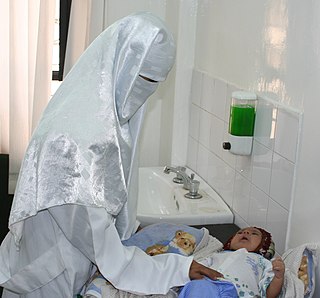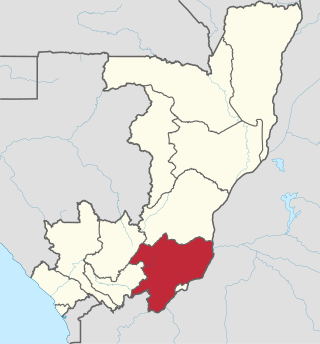Related Research Articles

The International Rescue Committee (IRC) is a global humanitarian aid, relief, and development nongovernmental organization. Founded in 1933 as the International Relief Association, at the request of Albert Einstein, and changing its name in 1942 after amalgamating with the similar Emergency Rescue Committee, the IRC provides emergency aid and long-term assistance to refugees and those displaced by war, persecution, or natural disaster. The IRC is currently working in about 40 countries and 26 U.S. cities where it resettles refugees and helps them become self-sufficient. It focuses mainly on health, education, economic wellbeing, power, and safety.
Humanitarian aid workers belonging to United Nations organisations, PVOs / NGOs or the Red Cross / Red Crescent have traditionally enjoyed both international legal protection, and de facto immunity from attack by belligerent parties. However, ' attacks on humanitarian workers have occasionally occurred, and become more frequent since the 1990s and 2000s. In 2017, the Aid Worker Security Database (AWSD) documented 139 humanitarian workers killed in intentional attacks out of the estimated global population of 569,700 workers. In every year since 2013, more than 100 humanitarian workers were killed. This is attributed to a number of factors, including the increasing number of humanitarian workers deployed, the increasingly unstable environments in which they work, and the erosion of the perception of neutrality and independence. In 2012 road travel was seen to be the most dangerous context, with kidnappings of aid workers quadrupling in the last decade, reaching more aid workers victims than any other form of attack.

An internally displaced person (IDP) is someone who is forced to leave their home but who remains within their country's borders. They are often referred to as refugees, although they do not fall within the legal definitions of a refugee.

Humanitarian aid is material and logistic assistance to people who need help. It is usually short-term help until the long-term help by the government and other institutions replaces it. Among the people in need are the homeless, refugees, and victims of natural disasters, wars, and famines. Humanitarian relief efforts are provided for humanitarian purposes and include natural disasters and man-made disasters. The primary objective of humanitarian aid is to save lives, alleviate suffering, and maintain human dignity. It may, therefore, be distinguished from development aid, which seeks to address the underlying socioeconomic factors which may have led to a crisis or emergency. There is a debate on linking humanitarian aid and development efforts, which was reinforced by the World Humanitarian Summit in 2016. However, the conflation is viewed critically by practitioners.
International humanitarian law (IHL), also referred to as the laws of armed conflict, is the law that regulates the conduct of war. It is a branch of international law that seeks to limit the effects of armed conflict by protecting persons who are not participating in hostilities and by restricting and regulating the means and methods of warfare available to combatants.

A humanitarian crisis is defined as a singular event or a series of events that are threatening in terms of health, safety or well-being of a community or large group of people. It may be an internal or external conflict and usually occurs throughout a large land area. Local, national and international responses are necessary in such events.
Human security is a paradigm for understanding global vulnerabilities whose proponents challenges the traditional notion of national security through military security by arguing that the proper referent for security should be at the human rather than national level. Human security reveals a people-centred and multi-disciplinary understanding of security which involves a number of research fields, including development studies, international relations, strategic studies, and human rights. The United Nations Development Programme's 1994 Human Development Report is considered a milestone publication in the field of human security, with its argument that ensuring "freedom from want" and "freedom from fear" for all persons is the best path to tackle the problem of global insecurity.
Lawfare is the use of legal systems and institutions to damage or delegitimize an opponent, or to deter individual's usage of their legal rights.
Humanitarian intervention is the use or threat of military force by a state across borders with the intent of ending severe and widespread human rights violations in a state which has not given permission for the use of force. Humanitarian interventions are aimed at ending human rights violations of individuals other than the citizens of the intervening state. Humanitarian interventions are only intended to prevent human rights violations in extreme circumstances. Attempts to establish institutions and political systems to achieve positive outcomes in the medium- to long-run, such as peacekeeping, peace-building and development aid, do not fall under this definition of a humanitarian intervention.

The International Committee of the Red Cross is a humanitarian organization which is based in Geneva, Switzerland, and it is also a three-time Nobel Prize Laureate. State parties (signatories) to the Geneva Convention of 1949 and its Additional Protocols of 1977 and 2005 have given the ICRC a mandate to protect victims of international and internal armed conflicts. Such victims include war wounded persons, prisoners, refugees, civilians, and other non-combatants.
There are a number of meanings for the term humanitarian. Here, humanitarian pertains to the practice of saving lives and alleviating suffering. It is usually related to emergency response whether in the case of a natural disaster or a man-made disaster such as war or other armed conflict. Humanitarian principles govern the way humanitarian response is carried out.
Various international and local diplomatic and humanitarian efforts in the Somali Civil War have been in effect since the conflict first began in the early 1990s. The latter include diplomatic initiatives put together by the African Union, the Arab League and the European Union, as well as humanitarian efforts led by the Office for the Coordination of Humanitarian Affairs (OCHA), UNICEF, the World Food Programme (WFP), the Puntland Maritime Police Force (PMPF) and the Somali Red Crescent Society (SRCS).
Madaya is a small mountainous town in Syria, located at an altitude of around 1,300 metres (4,300 ft). It is located about 40 kilometres (25 mi) northwest of Damascus in the Rif Dimashq Governorate and is home to Lake Barada, although this must be a metaphorical reference because there doesn't seem to be a lake anywhere nearby. According to locals in the area Lake Barada used to be bigger but due to pollution and industrial causes it has shrunk. Madaya often is snow-top during the winter months especially on January and February. According to the Syria Central Bureau of Statistics (CBS), Madaya had a population of 9,371 in the 2004 census. Its inhabitants are predominantly Sunni Muslims. Madaya is home to a large illegal market home to foreign brands that are smuggled in from Lebanon's Chtaura, which is close to the area.

Despite the significant progress Yemen has made to expand and improve its health care system over the past decade, the system remains severely underdeveloped. Total expenditures on health care in 2002 constituted 3.7 percent of gross domestic product.
The Harvard Humanitarian Initiative (HHI) is an interfaculty Harvard University initiative dedicated to advancing research, practice, and policy in the field of humanitarian assistance. HHI's mission is "to relieve human suffering in war and disaster by advancing the science and practice of humanitarian response worldwide".
There are multiple humanitarian, medical, economic, and industrial effects of the 2008–2009 Gaza War which started with the Israeli air strikes on 27 December 2008 and ended on 18 January with a cease-fire implemented unilaterally by Israel, and later the same day by Hamas and other Palestinian factions. The cease-fire followed twenty-two days of bombardment by land, sea and air which left over 1,300 Palestinians dead and over 5,000 injured, and the death of 13 Israelis. The United Nations Development Programme warned that there will be long-term consequences of the attacks on Gaza because the livelihoods and assets of tens of thousands of Gaza civilians have been affected.

Morobo County is a county in the Central Equatoria, South Sudan. Morobo County borders Uganda and Congo.

Emergency sanitation is the management and technical processes required to provide sanitation in emergency situations. Emergency sanitation is required during humanitarian relief operations for refugees, people affected by natural disasters and internally displaced persons. There are three phases of emergency response: Immediate, short term and long term. In the immediate phase, the focus is on managing open defecation, and toilet technologies might include very basic latrines, pit latrines, bucket toilets, container-based toilets, chemical toilets. The short term phase might also involve technologies such as urine-diverting dry toilets, septic tanks, decentralized wastewater systems. Providing handwashing facilities and management of fecal sludge are also part of emergency sanitation.
Yei River County is an administrative area in Central Equatoria with large population of people who settled in the area

The 2002–2003 conflict in the Pool Department was a military conflict between the government of the Republic of the Congo and the rebel Ninja militia which lasted from 2002 to 2003. It began in March 2002, when clashes between Ninja militias and the government drove thousands of civilians from their homes. On 12 March 2003, it was reported by the European Commission that the conflict had left 200,000 people "vulnerable and displaced". The conflict ended on 17 March 2003, when the government and the rebels signed a ceasefire.
References
- ↑ Gettleman, Jeffrey (2007-09-03). "Less access for humanitarians due to increased violence and fragmentation, says UN". The New York Times. Retrieved 2010-05-04.
- OCHA: Handbook of Humanitarian Terms (soon available online)